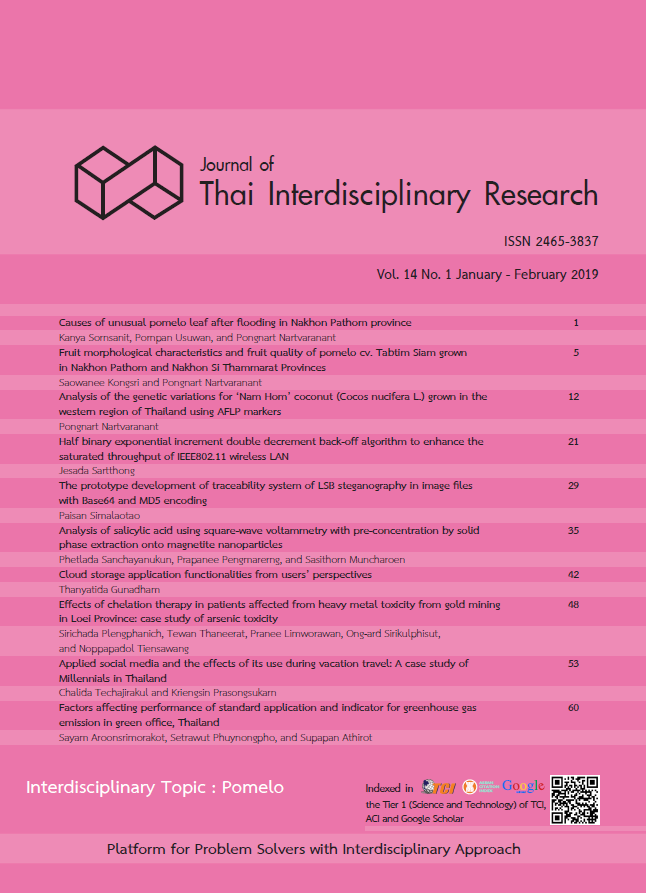Applied social media and the effects of its use during vacation travel :A case study of Millennials in Thailand
Main Article Content
Abstract
This research is focused on applied social media and the effects of its use during vacation travel on Millennials. The researcher investigated the usage of social network websites by traveller: before, during and after the vacation, granting comprehension on utilization levels, levels of association, and self-reliance. The 205 questionnaires were circulated to and gathered from experienced Thai travellers. It was found that the stage vacation when social media was mostly used was before the vacation as a tool for obtaining information, for instance information about accommodation and destinations. It was also found that there was a low correlation between levels of association with internet marketing and alterations made to vacation plans. In addition to this the findings appeared to show that social media was extensively used during the vacation for posting photos and looking for local activities. The result also showed that the information obtained from third party websites ismore reliable than mass media advertising and government websites.
Article Details
References
Bolton RN, Parasuraman A, Hoefnagels A, Migchels N, Kabadayi S, Gruber S, Loureiro Y K, Solnet D. Understanding Generation Y and their use of social media: a review and research agenda. Journal of Service Management. 2013: 24(3); 245-267.
Carmen C, Burgess S, Sellitto C, Buultjens J. The role of user-generated content in tourists' travel planning behavior. Journal of Hospitality Marketing & Management. 2009: 18(8); 743- 764.
Dann S, Dann S. E-marketing: theory and appli-cation. Palgrave Macmillan London, U.K. 2011. [4] East R, Wright M, Vanhuele M. Consumer Behavi–our, Applications in Marketing, 2nd Ed., Sage. 2013.
Fotis J, Buhalis D, Rossides N. Social Media Impact on Holiday Travel Planning: The Case of the Russian and the FSU Markets. International Journal of Online Marketing. 2011: 1(4); 1-19.
Google. The 2012 Traveler [Online] Available at: http://www.thinkwithgoogle.com/research-studies/the-2012-traveler.html
Hays S, Page SJ, Buhalis D. Social media as a destination marketing tool: Its use by national tourism organisations. Current Issues of Tourism Journal. 2012: 16; 216 – 239.
Johnson D, Grayson K. Cognitive and effective trust in service relationships. J. Bus. Res. 2005: 58(4); 500–507.
Kaplan AM, Haenlein M. Users of the world, unite! The challenges and opportunities of Social Media. Business Horizons. 2010: 53(1); 59–68.
Kotler P, Bowen J, Makens J. Marketing for Hospitality and Tourism, 5th Ed., Pearson. 2010.
Lee TY. HVS Consulting Trends of the next generation of travel: The Millennials. [Online]Available at: http://www.4hoteliers.com/features/article/7599
Litvin SW, Goldsmith RE, Bing P. Electronic word-of-mouth in hospitality and tourism management. Journal of Tourism Management. 2008: 29; 458- 468.
Lovelock CH, Writz J. Services marketing: peo-ple, technology, strategy, 7th Ed., Pearson. 2011
Mcleod A, Pippin S. Security and privacy trust in e-government: Understanding system and relation-ship trust antecedents. In Proceedings of the 42nd Hawaii International Conference on System Sciences (HICSS’09). 2009; 1–10.
Mintel. The Impact of Social Media on Tourism- International - August 2013 Available at: http://academic.mintel.com/display/643811/?highlight=true
Pizam A, Mansfield Y. Consumer Behaviour in Travel and Tourism. New York Howarth Hospitality Press. 2009.
Sekaran U. Research Methods for Business: A Skill Building Approach, 4th Ed., John Wiley & Sons. 2003.
Sherchan W, Nepal S, Paris C. A survey of trust in social networks. ACM Comput. Surv. 2003: 45(4).
SCB, Siam Commercial Bank. Capturing Thai Gen Y consumers [Online] Available at: https://www.scbeic.com/en/detail/file/.../Insight_Eng_GenY_2014.pdf
Suh B, Han I. Effect of trust on customer acceptance of Internet banking. Electron. Commerce Res. Appl. 2002: 1(3–4); 247–263.
Text100 Digital Index. Travel and Tourism Study [Online] Available at: http://info.text100.com/travel-tourism-digital-index-2012/info.text100.com/travel-tourismdigital-index-2012.html
UWTO, World Tourism Organization.The Power of Youth Travel [Online] Available at: http://wysetc.files.wordpress.com/2014/01/wysetc-unwto-report-english_the-power-ofyouth.pdf
Wang T, Lu Y. Determinants of trust in e-government. In Proceedings of the International Conference on Computational Intelligence and Software Engineering (CiSE’10). 2010; 1–4.
Xiang Z, Gretzel U. Role of social media in online travel information search. Journal of Tourism Management. 2010: 31; 179 – 188.


